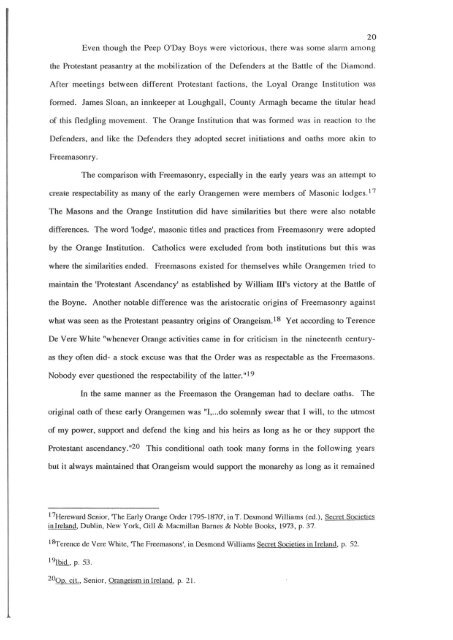TRANSPLANTED IRISH INSTITUTIONS - University of Canterbury
TRANSPLANTED IRISH INSTITUTIONS - University of Canterbury
TRANSPLANTED IRISH INSTITUTIONS - University of Canterbury
Create successful ePaper yourself
Turn your PDF publications into a flip-book with our unique Google optimized e-Paper software.
20<br />
Even though the Peep O'Day Boys were victorious, there was some alarm among<br />
the Protestant peasantry at the mobilization <strong>of</strong> the Defenders at the Battle <strong>of</strong> the Diamond.<br />
After meetings between different Protestant factions, the Loyal Orange Institution was<br />
formed. James Sloan, an innkeeper at Loughgall, County Armagh became the titular head<br />
<strong>of</strong> this fledgling movement. The Orange Institution that was formed was in reaction to the<br />
Defenders, and like the Defenders they adopted secret initiations and oaths more akin to<br />
Freemasonry.<br />
The comparison with Freemasonry, especially in the early years was an attempt to<br />
create respectability as many <strong>of</strong> the early Orangemen were members <strong>of</strong> Masonic lodges. 17<br />
The Masons and the Orange Institution did have similarities but there were also notable<br />
differences. The word 'lodge', masonic titles and practices from Freemasonry were adopted<br />
by the Orange Institution. Catholics were excluded from both institutions but this was<br />
where the similarities ended. Freemasons existed for themselves while Orangemen tried to<br />
maintain the 'Protestant Ascendancy' as established by William Ill's victory at the Battle <strong>of</strong><br />
the Boyne. Another notable difference was the aristocratic origins <strong>of</strong> Freemasonry against<br />
what was seen as the Protestant peasantry origins <strong>of</strong> Orangeism. 18 Yet according to Terence<br />
De Vere White "whenever Orange activities came in for criticism in the nineteenth centuryas<br />
they <strong>of</strong>ten did- a stock excuse was that the Order was as respectable as the Freemasons.<br />
Nobody ever questioned the respectability <strong>of</strong> the latter." 19<br />
In the same manner as the Freemason the Orangeman had to declare oaths. The<br />
original oath <strong>of</strong> these early Orangemen was "I, .. . do solemnly swear that I will, to the utmost<br />
<strong>of</strong> my power, support and defend the king and his heirs as long as he or they support the<br />
Protestant ascendancy. "20 This conditional oath took many forms in the following years<br />
but it always maintained that Orangeism would support the monarchy as long as it remained<br />
17Hereward Senior, 'The Early Orange Order 1795-1870', in T. Desmond Williams (ed.), Secret Societies<br />
in Ireland, Dublin, New York, Gill & Macmillan Barnes & Noble Books, 1973, p. 37.<br />
I ~erence de Vere White, 'The Freemasons', in Desmond Williams Secret Societies in Ireland, p. 52.<br />
19fbid., p. 53.<br />
200p. cit., Senior, Orangeism in Ireland, p. 2 1.
















